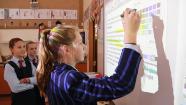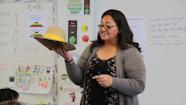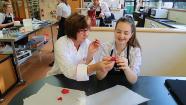Cheryl Pym describes the power of providing authentic experiences to engage students.
- Home ›
- Videos ›
- Exploring curriculum understandings beyond practice ›
- Technological experiences
Technological experiences
Duration: 02.27
Transcript
Technological literacy is developed through the exposure, or a programme of learning, that supports students to engage with the three strands of technology – so practice, nature, and knowledge. And that really means that programmes of learning have to have a wide range of technological experiences for students.
So, that looks like, engaging with practice, creating their own authentic outcomes, looking at case studies or visiting technologists in the field or bringing a technologist into the school, developing some knowledge and skills around the nature or knowledge strand, so that they have a breadth of experiences to draw from.
Authentic learning experiences in technology really engage the student. So it suddenly becomes a world and life of its own. The student is almost absorbed into solving a problem that has interest and relevance to that student.
An example of that I can think of is a boy that I spoke to, not so long ago really, he was making a very basic outcome in a materials class. And he was very disengaged, he was bored, he was listening to his iPod, he really wasn’t into what he was doing, and it was very much a ho hum activity for him. And in fact the brief was very superficial for the kids, they weren’t really problem solving.
So I chatted to this boy and it actually turned out that he was making at home musical instruments himself and he’d made several guitars and he was moving on to other things.
So the knowledge he brought into the classroom wasn’t being used. So the cultural and social capital he that had wasn’t part of his authentic learning experience. If he’d been a bit more open in the classroom to be allowed to engage with that, his learning experiences would have been far more uplifting for him but also probably far less problematic for the classroom and practitioner who was trying to deal with a disengaged student.
So authentic experiences are not only about engaging the student but also about engaging with the world around them. The practice would take on a whole new level.
Related videos
-
Growing knowledge beyond students' practice (02:27)
Claire Wood and a year 8 student talk about unpacking examples of technologists' practice to grow curriculum understandings.
-
Growing teacher knowledge of the technology learning area in primary (03:41)
Jude Black and Moira Patterson describe the technology-focused professional learning at Green Bay Primary.
-
Getting the context right (01:31)
Students, teachers, and the school community are interested and engaged in the projects and products in the technology programme, says Judi Delbridge....
Growing knowledge beyond students' practice (02:27)
Claire Wood and a year 8 student talk about unpacking examples of technologists' practice to grow curriculum understandings.
Growing teacher knowledge of the technology learning area in primary (03:41)
Jude Black and Moira Patterson describe the technology-focused professional learning at Green Bay Primary.
Getting the context right (01:31)
Students, teachers, and the school community are interested and engaged in the projects and products in the technology programme, says Judi Delbridge....



